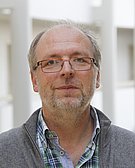Spiritual counselling at the end of life (SpECi study)
Project overview
Spiritual care has become established in the German-speaking world as a term for the shared concern of all healthcare professions for the existential, religious and spiritual resources, needs and problems of sick people and their relatives. Patients and residents often assign the perception and addressing of not only psychosomatic and psychosocial, but also spiritual needs and existential questions to employees in the health care system. In Germany, there is a great need to sensitise health care system employees across all professional groups to these needs of older and dying people and to empower them in spiritual/existential care.
The realisation of the project can have a lasting effect on the entire health care system in various ways: If it can be proven that the training of multipliers in and through spiritual/existential care has a positive effect, this increases the pressure on all those involved to develop further measures to improve spiritual care for older and dying people in health care systems. It would also argue in favour of including this concept in general education and training.

Further information
- Duration: three years
- Funding: Foundation for Welfare Care NRW
- Responsible: Professorship of Life Quality, Spirituality and Coping | Gerhard Kienle Chair of Medical Theory, Integrative and Anthroposophical Medicine
- Project partners: Evangelische Kliniken Essen-Mitte, Diakonie Rheinland-Westfalen-Lippe (RWL), Diakonie Deutschland, Diözesan-Caritasverband für das Erzbistum Köln, Deutsche Gesellschaft für Palliativmedizin (DGP), Deutscher Hospiz- und Palliativverein (DHPV)
- Further information can be found in the project flyer.
- News to the project
Aim of the study and methods
The newly developed SpECi curriculum is to be implemented and trialled in inpatient care facilities for the elderly, inpatient hospices and palliative care units with an interprofessional group of participants from healthcare professions at seven project locations and its effectiveness in terms of the spiritual health of the people they care for in the last year of life and their relatives is to be researched. In addition, the effects on the organisational, structural and personnel levels will be assessed in order to create appropriate framework conditions in the health care systems.
Intervention studies will be used for this purpose (training of employees with pre-post surveys on the part of those being cared for, their relatives and the trainees themselves).
Project management

Univ.-Prof. Dr.
Arndt Büssing
Professor
Faculty of Health (School of Medicine) | Chair of Medical Theory, Integrative and Anthroposophic Medicine
- +49 2330 62-3246
Orcid ID: 0000-0002-5025-7950
Gerhard-Kienle-Weg 4
58313 HerdeckeRoom number: Haus D, DG